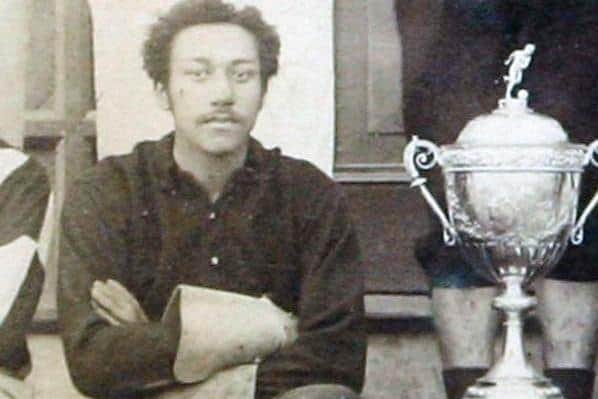Sheffield United: Blades icon Arthur Wharton honoured with blue plaque
and live on Freeview channel 276
A former Sheffield United football star has been honoured with a blue plaque.
The plaque was unveiled to honour Arthur Wharton, the man who is believed to have been the first black professional footballer in the world.
Advertisement
Hide AdAdvertisement
Hide AdAfter moving to England from Ghana in 1883, Arthur signed for Sheffield United in 1894, where he was understudy to regular first-team goalkeeper William “Fatty” Foulke. During the 1894-95 season, he played three games for the Blades, against Leicester Fosse, Linfield and Sunderland.
He later signed full-time for Rotherham Town in 1889, six years after moving to England from Ghana. And a plaque commemorating him is being installed at the Clifton Lane ground where that Rotherham team played.


It was unveiled by Ken Monkou, a former Chelsea and Southampton Premier League player. who is an ambassador for the organisation Give Racism The Red Card
Born in the Gold Coast, now known as Ghana, in 1865, to wealthy parents, Arthur Wharton moved to the north-east of England in 1883, aged 18, so he could receive an English education.
Advertisement
Hide AdAdvertisement
Hide AdHe also played for Darlington, Preston North End, and Stockport County.
He was also an Amateur Athletics Association national 100 yards champion in 1896 and a year later he set a record time for cycling between Preston and Blackburn.
He also ran two Rotherham pubs during his playing days, the Albert Tavern and the Plough Inn in Masbrough, becoming a miner at Edlington Colliery, near Doncaster, after he retired from sport.
He died in 1930 and was buried in an unmarked grave in Edlington, until the Arthur Wharton Foundation provided a headstone in 1997.
Advertisement
Hide AdAdvertisement
Hide AdIn 2003, he was inducted into the English Football Hall of Fame.
There is a 16ft statue of him at the FA's national football centre in Burton on Trent unveiled, and a small statuette in the president’s lounge at FIFA’s Zurich headquarters.
Comment Guidelines
National World encourages reader discussion on our stories. User feedback, insights and back-and-forth exchanges add a rich layer of context to reporting. Please review our Community Guidelines before commenting.
